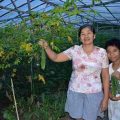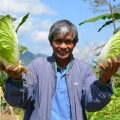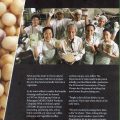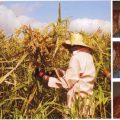Taro (Colocasia esculenta) or locally referred to as “gabi” is rich in starch and a good source of dietary fiber. In the Northern part of the country, taro is commonly grown as source of animal feed. Now, it is being produced and packaged into local delicacies (cookies, choco chip, choco cream, and choco voron) — which are excellent pasalubong for tourists and visitors.These taro delicacies are now found in the local market in Ifugao.
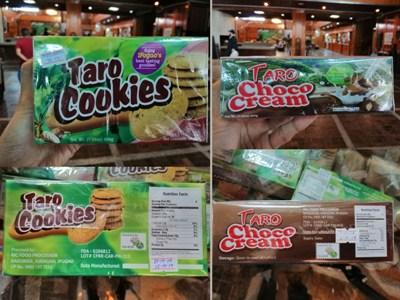
In 2017, the Provincial Local Government Unit of Ifugao submitted a proposal to the Bureau of Agricultural Research (BAR) to promote viable food and by-products to increase farmers income and promote livelihood opportunities of the province including taro.
Under BAR’s National Technology Commercialization Program, the project titled “Product Improvement and Promotion of Coffee, Tinawon Rice, and Taro Products” was funded. The funding support covered further product development and improvement, design assistance, and promotional activities.
BAR Director Nicomedes P. Eleazar during an official visit in Ifugao was delighted upon seeing the Taro Cookies and Taro Choco Cream on display and are being sold at Banaue Hotel in Ifugao.“This is a testament that government money has not been put to waste, after all the end goal of funding this initiative is to commercialize generated technologies and developed products and eventually bringing them into the mainstream market,” Dir. Eleazar said.
The taro delicacies are being produced by Rural Improvement Club (RIC) Food Processor in Baguinge, Kiangan, Ifugao which is one of the 10 existing associations and organizations and 12 individual processors of coffee, Tinawon rice, and taro products in the province assisted under the project. They received technical assistance on product packaging and labeling, developed capabilities of identified processors engaged in production of products; conduct of simple cost and return analysis, among others.

RIC Food Processors is composed of 1-6 clusters. Cluster-5 is engaged in food processing and is led by Lety Dogwe. Other members are helping in sourcing out raw materials in Barangays Haliap, Asipulo; Barangays Baguinge and Nagacadan, Kiangan.
In a week, 28 kilos of taro is being processed producing 240 boxes of Taro Cookies while 15 kilos of taro can produce 210 boxes Taro Choco Cream. Regular production could double depending on the bulk of orders.
Aside from Banaue Hotel, the taro products are also available in lodges, restaurants, souvenir shops, trade centers, public market in Lagawe, Banaue, and Kiangan. The RIC Food Processor is also distributing in Tam-an Resort in Bayombong, Nueva Vizcaya and in Baguio OTOP-DTI.
“We are thankful for the assistance provided to us to further improve the marketing appeal of our products. Also, the project provided additional income to farmers and also able to create job opportunities in food processing” Dogwe shared.
Taro products were also showcased during the 14th Agricultural Fisheries Technology Forum and Product Exhibition on Aug. 30- Sept 2, 2018 at SM Megatrade Hall, Mandaluyong City. ### (Ma. Eloisa H. Aquino)
